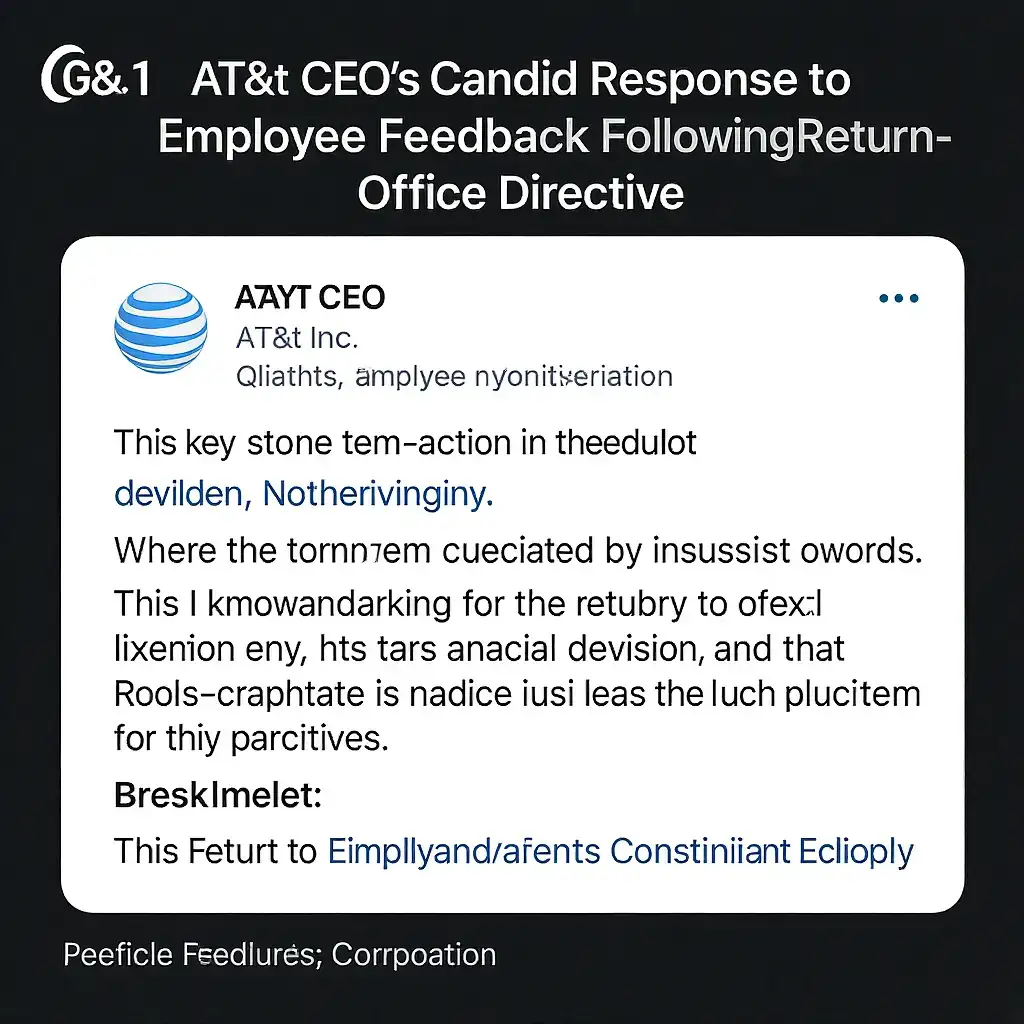Handicap International
AT&T CEO's Candid Response to Employee Feedback Following Return-to-Office Directive

Introduction
In a recent communication that has sparked considerable discussion among employees, AT&T's CEO John Stankey provided a forthright response to the findings of an employee engagement survey. His memo, directed to managers within the company, comes in the wake of a significant policy shift where AT&T moved from a hybrid working arrangement to a mandatory five-day in-office presence for its employees. This directive has led to a variety of reactions, and Stankey’s comments shed light on the company’s current strategies and objectives, as well as the expectations placed on its workforce.
Context of the Memo
The memo, which was shared on a Friday and later obtained by Business Insider, was in part a reflection on the results of the employee engagement survey, which engaged a substantial portion of AT&T’s workforce. Specifically, the survey captured the sentiments of over 99,000 employees, representing about 73% of the company’s total staff. Stankey expressed that he was "not surprised" by the decline in reported engagement levels, acknowledging the ongoing changes within the organization. His message aimed to clarify the alignment—or lack thereof—between employees’ professional expectations and the evolving strategic direction of AT&T.
Employee Engagement Survey Results
According to the results of the survey, a noteworthy 79% of respondents indicated that they felt committed and engaged with their work. However, the remaining percentage raised concerns about alignment with the company's new policies, particularly the abrupt transition to a five-day in-office work requirement. Stankey's memo emphasized that those who expressed skepticism about the changes, citing comments such as, "I have heard this nonsense before" or "things were just fine the way they were," might face a fundamental disconnect with the direction the company is heading.
Shifts in Company Culture
Stankey articulated a vision for what he described as a "more market-based culture" at AT&T. This shift entails moving away from traditional metrics of performance based on loyalty, tenure, and conformity, and instead focusing on rewarding individual capability, contribution, and commitment. This transformation is indicative of a broader trend in corporate America, where companies are increasingly prioritizing adaptability and performance-oriented metrics over long-standing practices.

The Return-to-Office Mandate
Earlier this year, AT&T made headlines when it decided to implement a policy that required employees to return to the office five days a week. This marked a significant departure from the previously adopted hybrid work model that many employees had come to appreciate during the pandemic. The response to this shift has been mixed, with some employees expressing frustration over difficulties in securing office desks and parking spaces. Compounding these challenges, competitors like Verizon have seized the opportunity created by AT&T's rigid policies to attract talent that prefers more flexible work arrangements.
CEO's Expectations on Workplace Environment
In his memo, Stankey underscored a critical aspect of the company's operational philosophy: the right for employees to expect a professional, well-maintained, and functional workplace. He acknowledged that ongoing and future investments are being made to improve office facilities, which aligns with his assertion that a conducive working environment is essential for maintaining productivity and employee morale. This investment in infrastructure reflects a broader corporate strategy aimed at fostering a positive and engaged workforce.
Corporate Communication and Employee Rights
Stankey’s direct approach in addressing employee concerns about the return-to-office requirement is reminiscent of a growing trend among executives in various industries. By clearly stating that employees should either adapt to the new working conditions or seek opportunities elsewhere, he delineates a line in the sand regarding corporate expectations. His comments effectively communicate that while employee needs are important, they must align with the company's strategic imperatives, especially in a highly competitive and customer-focused environment. According to Read AT&T CEO's Frank Response to Employee Survey After RTO Mandate - Business Insider,
Financial Performance and Stock Market Response
Despite the challenges faced with employee morale and the return-to-office policy, AT&T's stock has shown resilience. As of August 2023, shares of AT&T had surged more than 21% since the beginning of the year. The company reported robust earnings that met or even surpassed analysts' expectations, indicating that operational changes, despite their contentious nature, may be paying off financially. This financial success could provide AT&T with the leverage needed to justify its strategic decisions to its workforce and the market at large.
Reflections on Corporate Disruption
In his memo, Stankey reflected on the necessity of disruption for long-term sustainability, noting that many century-old companies have had to reinvent themselves to remain relevant. He posed a rhetorical question about finding examples of established organizations that have managed to survive without embracing change, emphasizing the need for AT&T to adapt to shifting market demands. Such reflections are pivotal as they not only frame the conversation around AT&T's current trajectory but also highlight the broader corporate landscape where innovation and agility are paramount.
Conclusion
The communication from AT&T's CEO is a clear indication of the pressing need for alignment between employee expectations and corporate strategies. As the company navigates the complexities of a post-pandemic workplace, the responses from employees will undoubtedly influence future policies and practices. While Stankey’s frank acknowledgment of the situation may not sit well with everyone, it underscores the reality that organizations must evolve and adapt to succeed in an ever-changing environment. The ongoing discourse about return-to-office mandates will likely continue to shape the corporate culture at AT&T and beyond, as companies grapple with the best ways to balance employee satisfaction with operational efficacy.